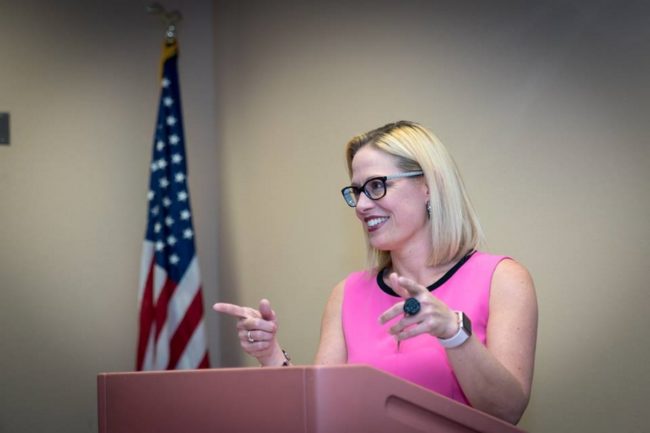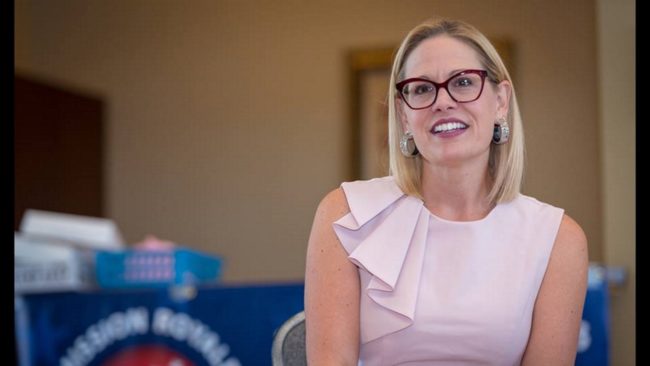Kyrsten Sinema is the First Bisexual US Senator
Kyrsten Sinema has won a landmark victory to represent Arizona in the US Senate, becoming the first ever openly bisexual senator.
The Democratic congresswoman, who has already served three terms in the US House of Representatives as the only openly bisexual member of Congress, narrowly defeated Republican candidate Martha McSally to replace Jeff Flake, a Republican senator who retired ahead of the midterm elections.
With her nail-biting victory, the margin of which currently stands at just 38,000 votes, she became the country’s second out LGBT+ senator alongside Wisconsin’s Tammy Baldwin, who was re-elected last week in a double-digit landslide.

US’s first bisexual Senator calls for unity
Sinema, who was also the first ever openly bisexual senate candidate for a major party, reacted to the win by writing on Twitter: “As long as I’ve served Arizona, I’ve worked to help others see our common humanity & find common ground.
“That’s the same approach I’ll take to representing our great state in the Senate, where I’ll be an independent voice for all Arizonans.”
Speaking to ecstatic supporters in the state capital of Phoenix, Sinema took aim at Republican tactics which have seen McSally accuse her of “treason” and “protesting us in a pink tutu” during a fractious election campaign.

Sinema said: “Arizona rejected what has become far too common in our country: name-calling, petty, personal attacks and doing and saying whatever it takes just to get elected.
“We can embrace difference while seeking common ground.”
— Kyrsten Sinema
“It’s dangerous, and it lessens who we are as a country. But Arizona proved that there is a better way forward.”
In a call for unity and acceptance, Sinema continued: “We can work with people who are different than us. We can be friends with people who are different than us.
“We can love and care about people who are different than us. We can keep people who different than us safe. We can be good people who care deeply about each other even when we disagree.”
The 42 year old, who was first elected to her state’s House of Representatives when she was 28, added: “We can embrace difference while seeking common ground.”
Democratic National Committee chair Tom Perez congratulated Sinema on a “stunning victory,” adding that “Arizonans went to the polls last Tuesday looking for bold new leadership, and that’s exactly what they’re going to get with their first-ever female senator and our nation’s second openly LGBTQ senator.”
“Unlike her predecessor, Senator-elect Sinema is ready to fight on day one for quality health care, a VA system that works the way it should for our veterans, comprehensive immigration reform, good-paying jobs, and an economy that works for all Arizonans.”
Annise Parker, CEO of the LGBTQ Victory Fund, said: “An LGBTQ woman winning a U.S. Senate seat in a state that voted for Trump is a game-changer, both for the LGBTQ community and the Democratic party.
“Kyrsten’s victory makes clear that an LGBTQ candidate who listens to voters and prioritises their issues can win elected office anywhere—blue state or red state.

“It also signals to the Democratic party that nominating more LGBTQ candidates for high-level positions should be a strategic priority, because their openness and authenticity resonate with independent voters.”
She added that “by doubling our influence with two passionate and tough LGBTQ women… the U.S. Senate will certainly find our community more difficult to ignore.”
It is the first time a Democrat has held a Senate seat in Arizona since 1995, and ensures the Democrats will fill at least 47 of the Senate’s 100 seats, with Florida’s race going to a recount and Mississippi awaiting the results of a run-off later this month.
Kyrsten Sinema has a pro-LGBT record—unlike her opponent
During her nearly six years in Congress, Sinema—who won her Democratic primary with an overwhelming 80.5 percent of the vote—has repeatedly taken a stand for LGBT+ rights.
The Arizona-born politician, who spoke at the Human Rights Campaign gala this year, co-sponsored the Equality Act, which would amend the 1964 Civil Rights Act to also ban discrimination on the basis of sexual orientation and gender identity.

Sinema also sponsored HR4041, a bill currently in committee which, if it were passed, would ensure that transgender people were able to serve in the US military, despite President Donald Trump’s attempts to institute a ban.
In contrast, McSally voted for an amendment which would have made it impossible for the military to pay for gender surgeries for its trans service people, and stood against using Title IX to protect the right of trans students to use the bathroom which matches their gender, an issue which has been mainly used by Republicans as a way of fighting against trans equality.